
It’s hard to ignore Google. The company has a huge foothold as the number one search engine. It’s because Google is the most used search engine that you need to pay attention to it.
2020 is right around the corner and as you plan it is important that you know how Google will impact your business. Knowledge is power and in this case, knowing what Google is up to is knowledge you must have to be successful in 2020 and beyond.
There are four things that I want you to consider as you plan:
- Search Engine Results Page (SERP) Features
- Desktop vs. Mobile Search
- Zero-Click Searches
- Competition with Google
Google SERP Features
Algorithm changes aren’t the only thing that can impact Google search results.
Earlier this year I read an article by Andy Crestodina titled “The Biggest Trend in SEO.” It was a fascinating look at how Google’s search results pages have changed over the last several years.
Take a look for yourself. This first image is a SERP from 2014.
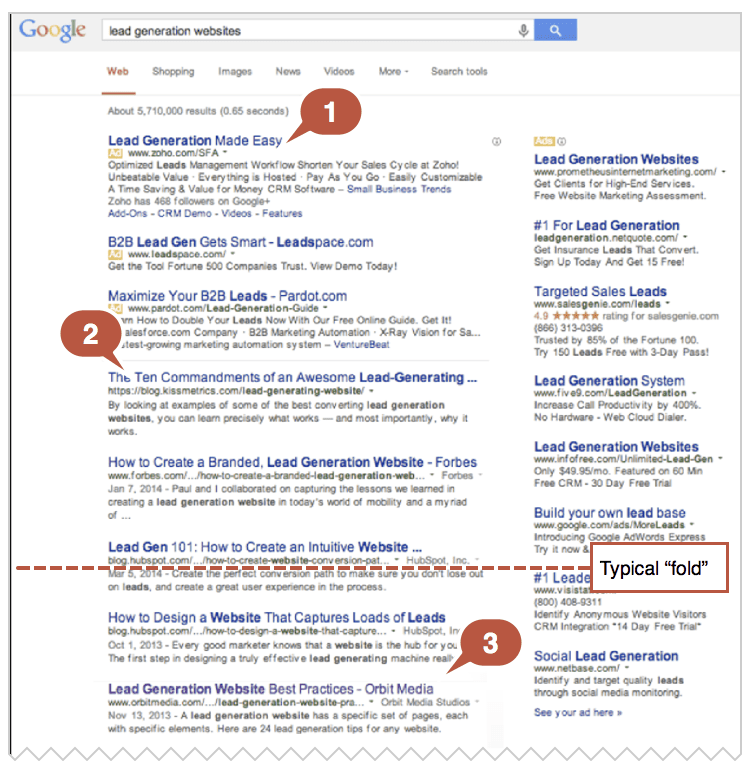
As you can see there are a lot of ads. There are three before the results and a list on the right side. They are marked in yellow so they stand out.
Andy uses the term fold. What is that?
Fold is the term used to describe a browser’s bottom order. Above the fold refers to the portion of the website that you can see without having to scroll. Below the fold is the content that you have to scroll down to see.
You can see that the results of this search start above the fold.
The 3 in the image represents an article Andy wrote that is on the first page of SERP results which is ranked at #5. It’s just below the fold.
Now take a look at a SERP from 2019.
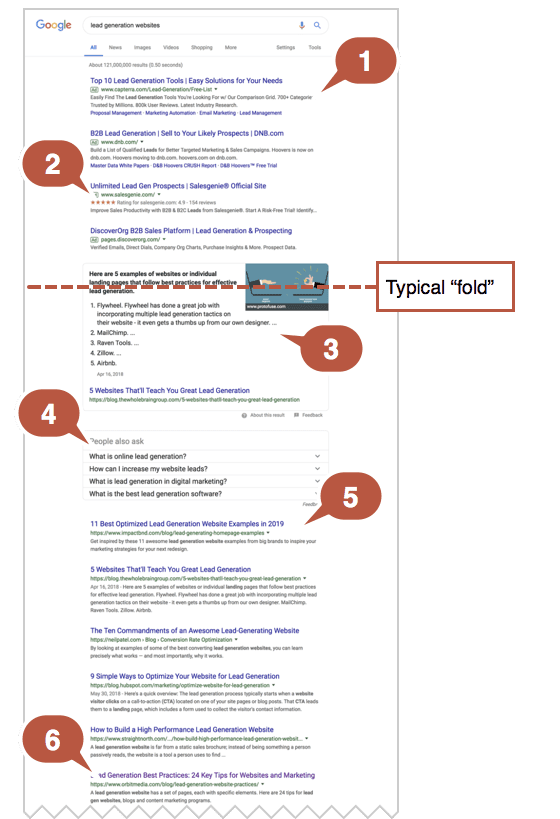
There are fewer ads. In fact, the ads are completely gone from the right of the page. However, there are more ads before the results. In fact, they take up almost all the real estate above the fold. They also aren’t called out as clearly as before.
Where the results came right after the ads in 2014, in 2019 there are a couple of SERP features that precede the results for this search.
The first feature is what is called a featured snippet. This feature is designed to provide a potential answer to the search. If the featured snippet answers the searcher’s question there is not a need to scroll down the page to view the search results.
The second feature is list related questions titled “People Also Ask”. In this case, there are four related questions that you can open to see if they provide the information you are looking for.
There are many SERP features that could appear depending on the relevance to the search which including maps, videos, images, and star reviews to name a few.
After the related questions, Google finally gives some search results but look how much further down it is compared to the example from 2014.
Andy’s article went down one spot over the last five years but notice how much further down the page it has been pushed. Before it was just below the fold and now it is at the bottom of the page.
What can we take away from this example?
- SERP Features can push the search results down the page
- A high search rank doesn’t guarantee high visibility in SERP results
Desktop vs Mobile Search
More people have mobile devices than ever. The result has been that there are now more mobile searches than desktop searches.
According to Statista, searches in mobile overtook desktop searches on Google over three years ago. Mobile searches also account for over 50% of searches other search engines such as Yahoo and DuckDuckGo (oddly desktop search still dominate on Bing).
64% of Google searches come from mobile devices. As Google is the dominant search engine, this is a big deal but the impact is more ominous.
Zero-Click Searches
Rand Fishkin (co-founder and former CEO of Moz, current co-founder and CEO of SparkToro, and author of Lost and Founder: A Painfully Honest Field Guide to the Startup World) wrote a great article dealing with the topic of zero-click searches in August.
The article was sobering. Look at the chart below and you’ll get an idea why.
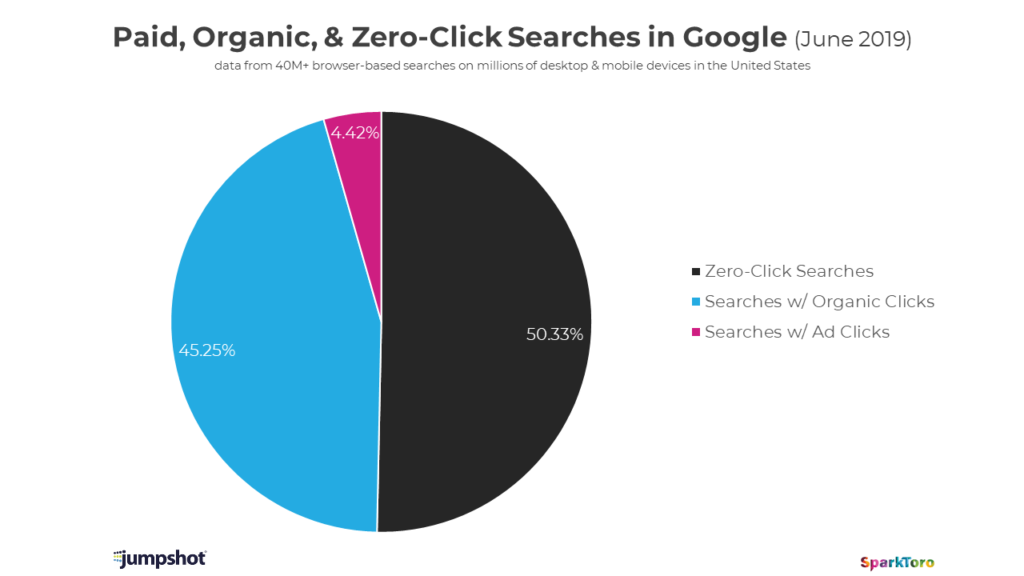
50.33% of searches on Google don’t result in a click. In other words, they never leave Google.
Wow.
Guess what? On mobile, it’s even worse.
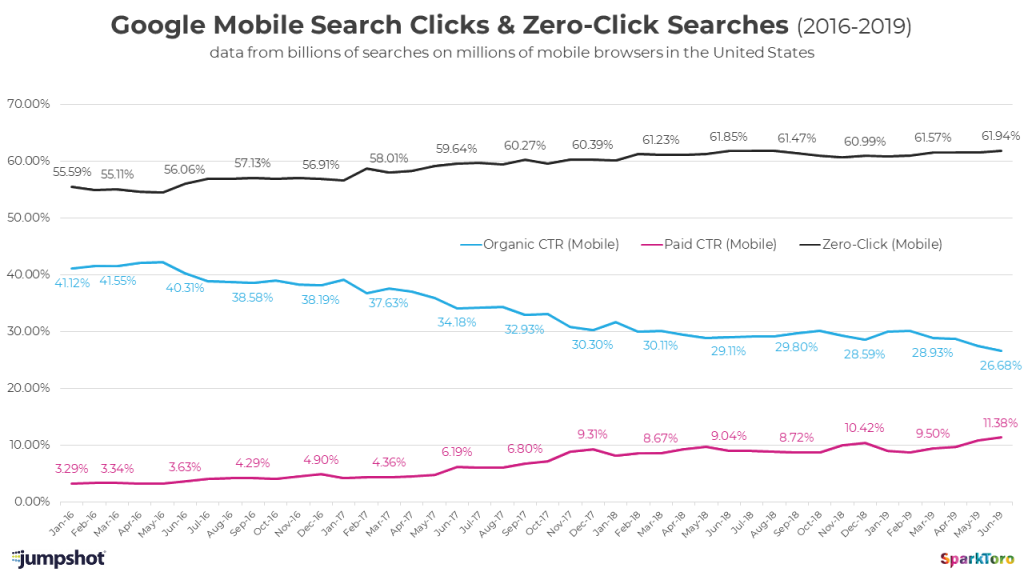
Since January of 2016, the majority of mobile searches on Google were zero-click searches. That number has hovered between 60% and 62% for over two years.
For reference, according to the data from Jumpspot and SparkToro, zero-click searches from the desktop have been around 33% for the last couple of years.
To put it in perspective, 64% of Google searches are on mobile of which around 60% are zero-click searches.
That is alarming but it can’t get any worse right?
Competing with Google
Rand has spent a lot of time in 2019 talking about how Google dominates search and what they have been doing to hold onto this traffic.
This is bad news for those of us that count on Google to direct traffic to our site.
About three weeks ago I viewed Rand’s slide deck titled “Google in 2020: From Everyone’s Search Engine to Everyone’s Competitor”. I don’t know about you but I don’t find much optimism in that title. You can view the slide deck yourself here.
I’ve got to say it made me sick. Literally.
Let me show you some examples that I found were inspired by his presentation.
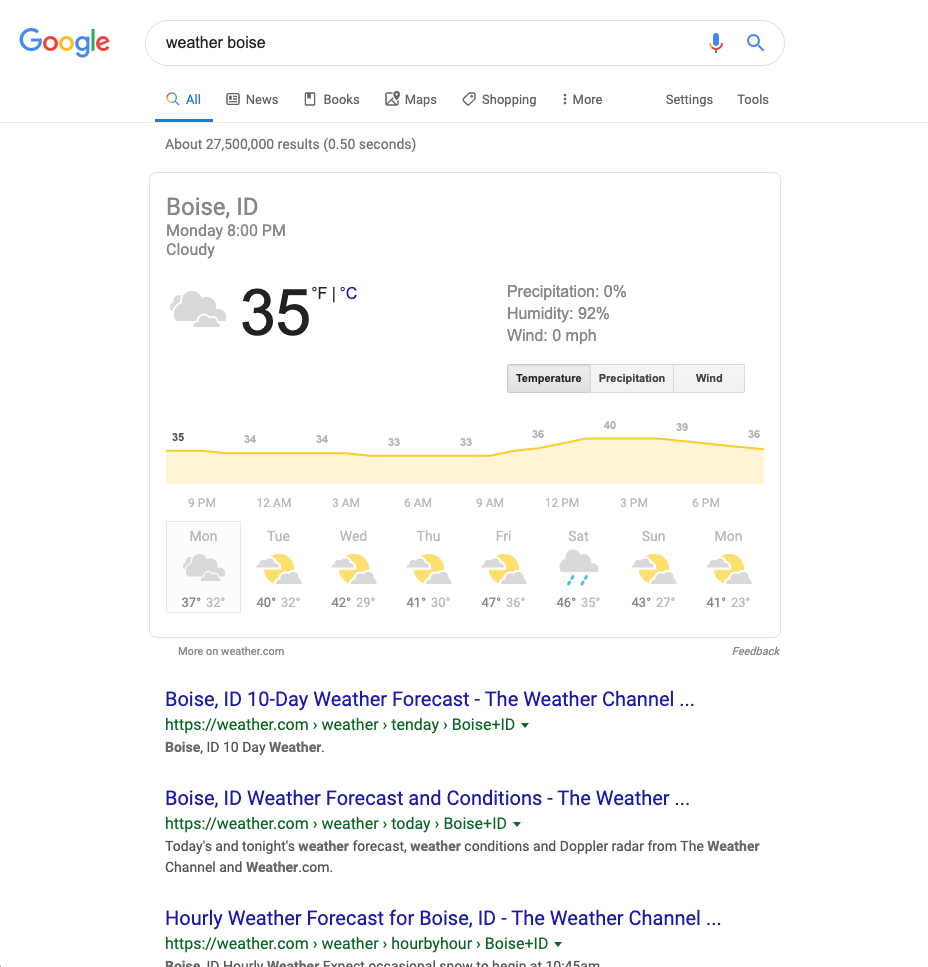
Google has the weather which it got from weather.com. This removes the need to go outside of Google.
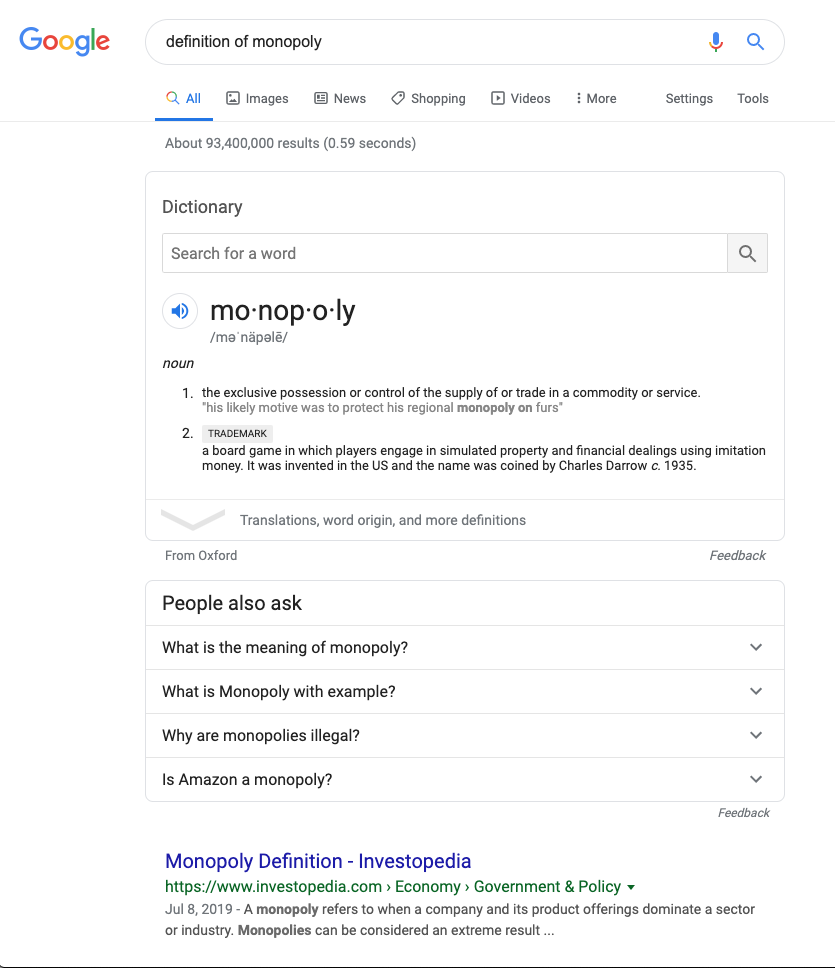
Why go to a dictionary site like Merriam-Webster when Google has it? Notice how the information was pulled from the Oxford Dictionary site.
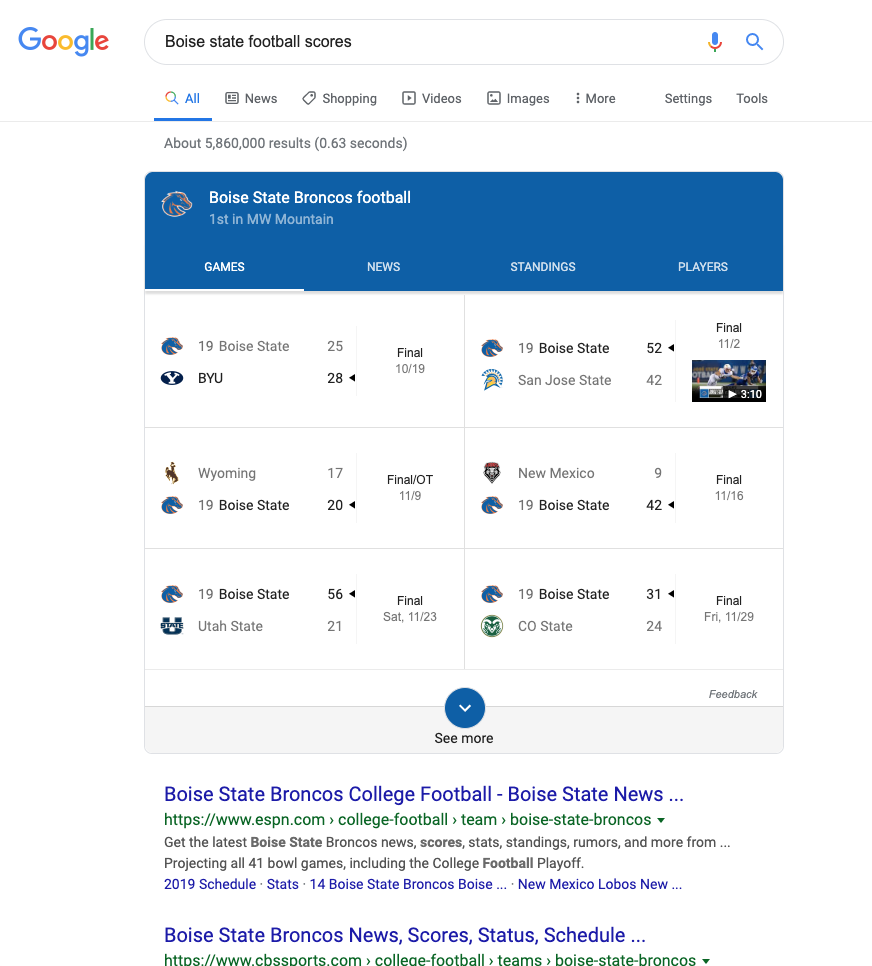
I don’t need ESPN, Yahoo Sports, or my local media. Google has it covered.
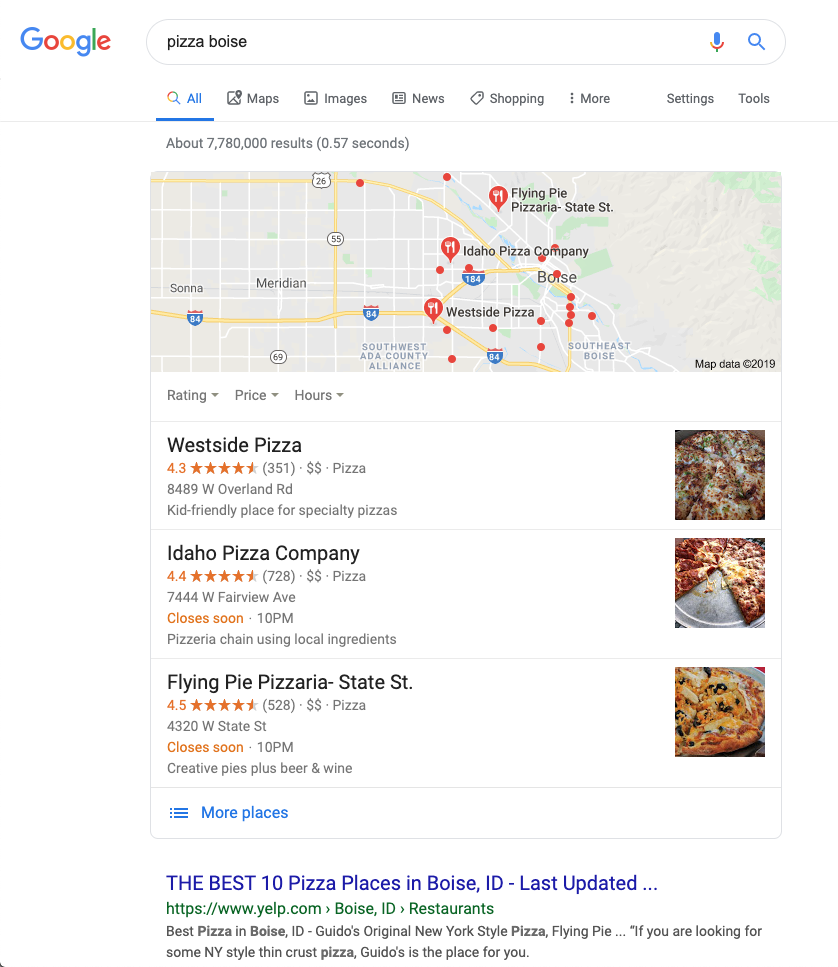
Sorry Yelp. I don’t need to go to your site. I have a list of pizza places and ratings courtesy of Google.
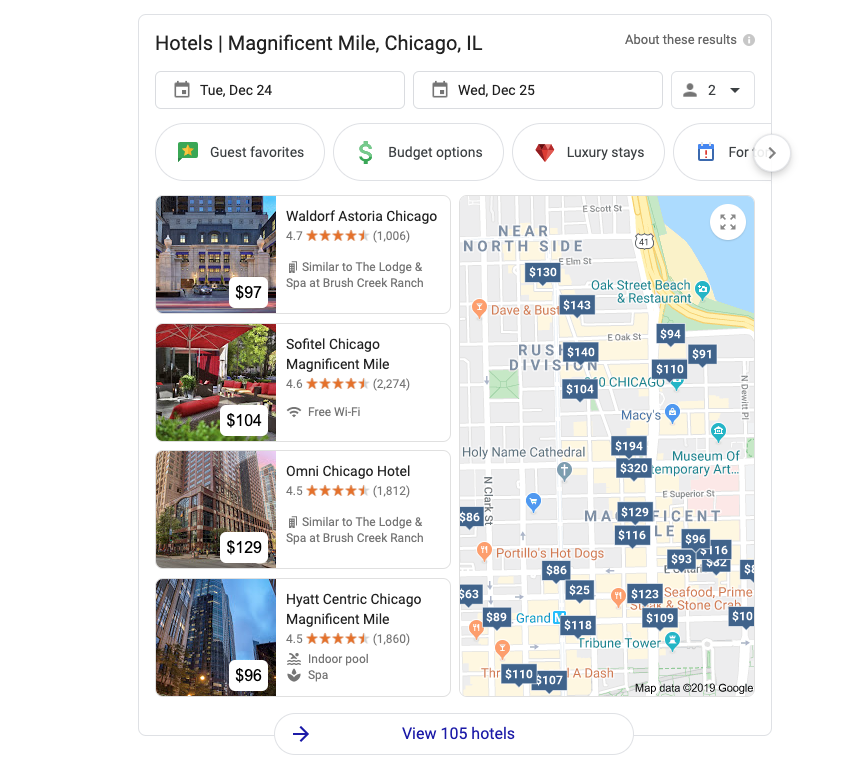
This Google search for hotels came with ratings and prices. I wonder if Expedia is worried?
In the past, we would have searched and been directed to a weather site, an online dictionary, ESPN, Yelp, or Expedia, Now if you search in Google, it has the info. This means that Google is competing with all these sites.
For some, Google has stopped being just a search engine that sends them traffic and has become a competitor.
Is this happening to you? Could it happen to you? Be honest with yourself and before you answer no, check out Rand’s slide deck at the link at the beginning of this section.
What Do You Do
Google is the dominant search engine. You can’t exactly avoid it, so what do you do?
As your planning, you need to consider how you can attack these challenges and make them work to your advantage.
It’s not a coincidence that Google Features in search results have had an impact to create zero-click searches. Especially on mobile.
Search rankings haven’t been impacted but where those results appear on the page have been impacted.
Google has also put itself in the position of competing with many sites to hold onto the traffic. This is a trend that is going to accelerate.
All of this means less traffic being sent to your website.
To compete, you are going to have to use Google’s features to benefit us.
It’s not going to be easy and we all have work to do. It doesn’t matter how big and successful the brand is. If you don’t do the work it won’t translate to Google.
Identify where you can compete for features such as featured snippets, in the related questions, videos, images, etc.
This is going to involve some research to understand what people are searching for where you can compete. If you can’t compete, you will have to cede the keyword and find where you can compete. There isn’t an alternative.
What do you think about these Google trends impacting search? Let’s talk in the comments
- Is Your Marketing Connected? - March 6, 2025
- Stop Planning and Start Strategizing - October 24, 2024
- The Importance of Creating a Connection With Your Marketing - June 6, 2024
